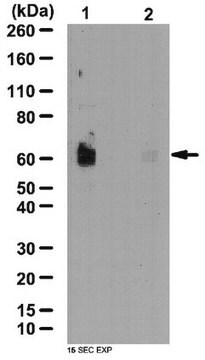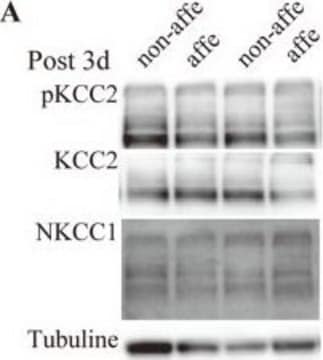ABS1004
Anti-phospho-NKCC1 Antibody (Thr212/Thr217)
serum, from rabbit
Synonym(s):
phospho-NKCC1 Thr212/Thr217, Solute carrier family 12 member 2, Basolateral Na-K-Cl symporter, Bumetanide-sensitive sodium-(potassium)-chloride cotransporter 1
About This Item
Recommended Products
biological source
rabbit
Quality Level
antibody form
serum
antibody product type
primary antibodies
clone
polyclonal
species reactivity
human
technique(s)
immunofluorescence: suitable
western blot: suitable
NCBI accession no.
UniProt accession no.
shipped in
dry ice
target post-translational modification
phosphorylation (pThr212/pThr217)
Gene Information
human ... SLC12A2(6558)
General description
Specificity
Immunogen
Application
Signaling
Signaling Neuroscience
Immunofluorescence Analysis: A representative lot detected phospho-NKCC1 Thr212/Thr217 in GBM43 human tissiue (Dr. Anders Persson, UCSF) (Grim, R.P., et al. (2012). JBC. 1-31).
Quality
Western Blotting Analysis: A 1:1,000 dilution of this antibody detected phospho-NKCC1 Thr212/Thr217 in 10 µg of GMB43 cell lysate.
Target description
Physical form
Storage and Stability
Handling Recommendations: Upon receipt and prior to removing the cap, centrifuge the vial and gently mix the solution. Aliquot into microcentrifuge tubes and store at -20°C. Avoid repeated freeze/thaw cycles, which may damage IgG and affect product performance.
Other Notes
Disclaimer
Not finding the right product?
Try our Product Selector Tool.
Storage Class Code
10 - Combustible liquids
WGK
WGK 1
Certificates of Analysis (COA)
Search for Certificates of Analysis (COA) by entering the products Lot/Batch Number. Lot and Batch Numbers can be found on a product’s label following the words ‘Lot’ or ‘Batch’.
Already Own This Product?
Find documentation for the products that you have recently purchased in the Document Library.
Our team of scientists has experience in all areas of research including Life Science, Material Science, Chemical Synthesis, Chromatography, Analytical and many others.
Contact Technical Service








